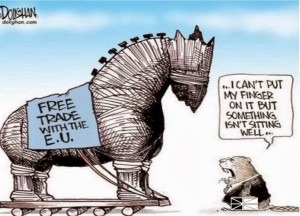 When one hears the two words, “free trade”, what immediately comes to mind? I think
When one hears the two words, “free trade”, what immediately comes to mind? I think
reduction in tariff barriers and increased in economic productivity. However for Canada,
this is not necessarily the case. The Government insists that CETA will increase job
employment, improve overall economic activity in Canada and make Canada a North
American regional powerhouse for economic growth and prosperity. The
CETA deal with the E.U is set to be the biggest trade agreement in history (Wikipedia),
surpassing the North American Free Trade Agreement (NAFTA). What does this mean
for the average and working class Canadians? Well, it is a threat. This is because we could be witnessing the rise of global corporate power
whereby maximizing profit is the single most important objective. In my opinion, this trade agreement is going to garner short-term benefits
but deteriorate the Canadian economy in the long-run. And here are a few reasons why.
With CETA in effect, 98% of the tariffs (Wikipedia) between Canada and the E.U will be reduced. Meaning, less duties are paid on imported
and exported goods. Large businesses would have more accessibility to the Canadian market. So, what happens when you have several local
Canadian businesses and firms going up against large and mighty global corporations? There is almost no way these small businesses can
compete. As a result, Canadians would lose jobs to pave the way for international corporations and their businesses. It’s not clear now
but bear in mind what happened after the U.S-Canada free trade agreements was signed in the late 1980’s. Around 200,00 jobs were
lost (BBC) because of competition with large corporations from the U.S. Something similar could happen to Canadians in the next 2 to 3
years if CETA goes through.
Furthermore, the trade agreement could signal the decline of Canadian sovereignty. How? Well, sections on CETA allow
European corporations to somehow override domestic Canadian laws (BBC) in favor of promoting profitable business opportunities.
I am slightly uncertain of what kind of domestic laws but Canadians ought to know that this is the most
dangerous aspect of the CETA deal. What maintains a nation to be sovereign are its laws. For Canada, this is not good because it would
mean that Canadian laws are at the mercy of global corporations. What’s worse, if the Canadian government gets in the way of international
companies doing business anywhere in Canada, these companies can effectively can sue the government (Globe and Mail). This is what
people mean when they mention “corporate takeover”.
Well, my position is that the Canadian government needs to consider both the political and economic repercussions of the CETA deal and
not be blinded by only the economic benefits that actually may be disproportionately distributed to the Canadian people. Who reaps the most
benefit if this deal goes through? That should be the main question. In Europe on the other hand, it still needs to be approved by the
European Parliament and European Council (Wikipedia), and that’s where further debate can be made. I suggest strongly that the Canadian
public pay close attention to the CETA deal as it is discussed in Europe as well, and not just here. While doing some reading on this CETA, I
came across a very intriguing phrase, “investor bill of rights”. Wow. It seems that when Canada deals with big corporations from abroad, it
as if they are dealing with a “sovereign nation”.
Hence in conclusion, I employ the Canadian population to further investigate the CETA deal and take action. We live in a democratic country
and that definitely has to count something, especially here in Canada. Take a stand and be fully aware of the short-term and long-term
economic effects of CETA. Remember, what is economical can be political. And what is political is personal.
GO CANADA!